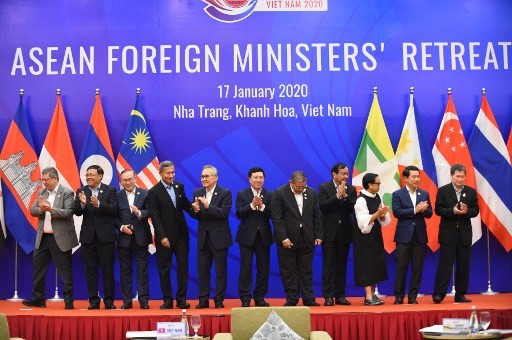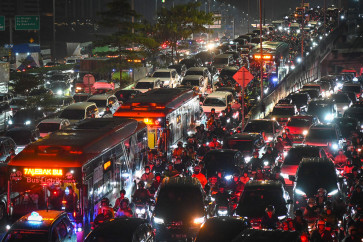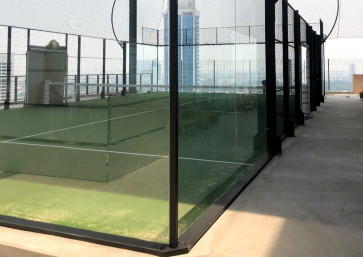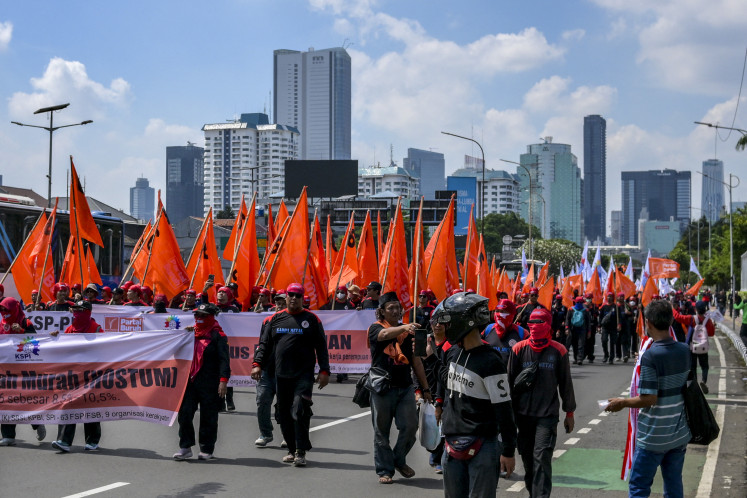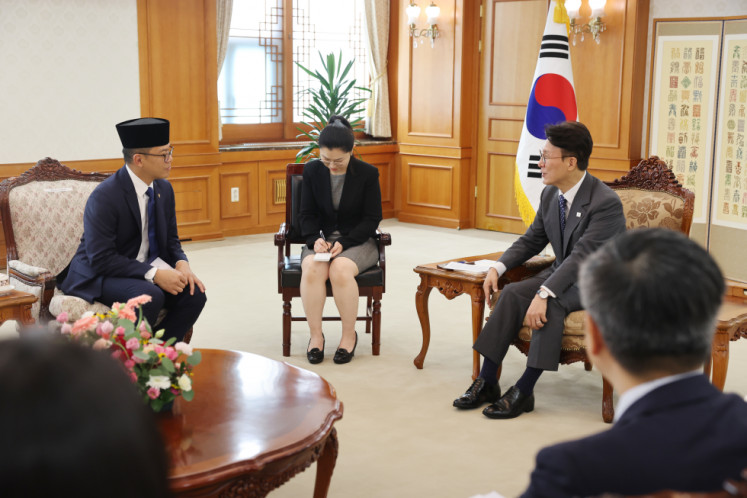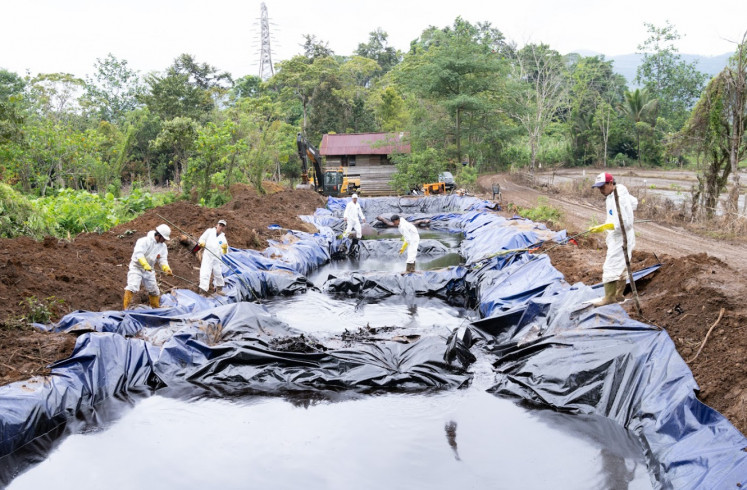Popular Reads
Top Results
Can't find what you're looking for?
View all search resultsPopular Reads
Top Results
Can't find what you're looking for?
View all search resultsA bolder EU, a more assertive ASEAN
A stronger defense cooperation within ASEAN can be part of the toolkit of actions that might rebalance the current status quo increasingly seen tipping on the side of Beijing.
Change text size
Gift Premium Articles
to Anyone
T
o better understand the relevance of Southeast Asia in the world, we should look at the Manama Dialogue organized by the International Institute for Strategic Studies (IISS) last week. Along with United States Defense Secretary Lloyd J. Austin, Indonesian Defense Minister Prabowo Subianto and Malaysian Senior Defense Minister Hishammuddin Tun Hussein were notable key speakers from outside the Gulf region.
The presence of two leaders from the ASEAN community in a regional forum, known for its focus on the geopolitics of the Gulf region, is emblematic of the importance that Southeast Asia is assuming on the world stage.
Both spoke about the importance of adding to ASEAN’s cooperation framework, a more overt security and military dimension that, slowly and far from the headlines, is inevitably taking shape.
While talking about the desire to maintain harmony and peace in the Asia Pacific, Prabowo and Hishammuddin did not hesitate to talk about projections of power and strength in military terms and, interestingly, they took a semi-regional approach to this.
Hishammuddin spoke of the recently relaunched Trilateral Cooperation Arrangement (TCA), a security partnership between Malaysia, Indonesia and the Philippines.
“We are now preparing trilateral patrols between India, Indonesia and Australia, Malaysia, Indonesia, Thailand and Singapore,” Prabowo shared in reference to Indonesia’s will to reaffirm a regional approach to its national interests in the South China Sea.
Looking at the latest events in the eastern parts of ASEAN, what Manila sees as the West Philippine Sea, China seems undeterred from showcasing its military power to reaffirm its presumed rights. Talking about common defense in ASEAN makes total sense.
A stronger defense cooperation within ASEAN can be part of the toolkit of actions that might rebalance the current status quo that is increasingly seen tipping on the side of Beijing. While there is still a long way to go for a real joint defense in ASEAN, the TCA could effectively be enlarged to include other members of the organization.
For example, if Vietnam could join the initiative, then we would have the potential for a real game changer and we should not forget that such mechanisms are outside of the unanimity-driven ASEAN institutional framework.
“While progress on the Code of Conduct has been positive thus far, it is only prudent for our optimism to be guarded. Tensions between both major powers in our region are unavoidable, as the sea is one of the world’s busiest shipping routes coupled with the existence of vast resources under the seabed. Undoubtedly, this is a complex issue and it must be approached with cautious practicality,” Hussain said.
Prabowo, unexpectedly, given his background, was not shy in talking about the importance of military strength to build peaceful relationships in the region. He even mentioned Thucydides, “the strong will do what they can; the weak suffer what they must.”
While the US tried to reassert its strategic interest in maintaining peace and stability with Austin reaffirming the “strategic imperative of partnership”, many observers are now looking at how the EU is patiently finding its own standing in translating its “principled” and multilateral partnership approach into actions on the ground.
Against this backdrop, the upcoming Asia-Europe Meeting (ASEM), can provide, quietly on the sidelines, the framework to strengthen the EU resolution to be a strong and reliable partner in Southeast Asia.
The formal agenda would be focused on less controversial issues like cooperation in the fight against the pandemic, regional connectivity, support to shift to net-zero in the next few decades and other soft power initiatives.
These are, after all, the areas where the EU can play a big role and are the dimensions where Europeans will certainly increase their financial and technical support.
Given the recent high-level contact between ASEAN and the EU, there is no doubt that the Europeans will be more than willing to expand what they are best known for, their soft power. To mark a real impact here, the EU needs a few transformational initiatives.
One could be shifting gears in providing funding to harness regional connectivity, a plan that is totally aligned with ASEAN’ s own strategy to integrate through better common infrastructures. The EU-Asia Connectivity Strategy could bring the now strategic dimensions between ASEAN and the EU to a level for which the partnership between Europe and Southeast Asia is truly indispensable.
The EU must further boost its support for programs that can directly impact the collective imagination of ASEAN citizens. Leveraging the work currently being done in the area of a common higher education area, for example, could offer an ambitious pathway of cooperation to grow.
Broadening the ongoing support to the ASEAN Secretariat is also a safe bet, but such types of institutional partnerships that focus on the capitals of the region should not overshadow more vigorous support to the civil society of Southeast Asia.
A new substantial line of funding in the field of democracy and human rights, coordinated by the EU Mission to ASEAN, could also signal the value-based dimension the EU attaches to its partnerships around the world.
Yet there will also be issues that might not be included in the formal agenda of the summit, which also will include other nations from the Asia Pacific, and with this, we go back to the core of the Manama Dialogue: security and defense cooperation.
On Nov. 15, the EU foreign affairs and defense ministers had a joint session to comment on the first draft of the EU Strategic Compass, a key global geopolitical document that, after years in the making, will be finalized in March 2022.
One thing is clear: ASEAN needs a dependable partner, a partner that is able to mobilize resources to help its process of development and further integration but also a partner that is capable of providing more than just soft power. At the same time the EU, despite its internal divisions, is anxious to be seen relevant.
The EU will not become a military power overnight and the US will remain the superpower, but this is a role that it is, reluctantly, sharing with Beijing.
Having the right compass guiding Europe’s global aspirations and directions will offer support and wider latitude for the regional integration in Southeast Asia to include a clear and visible security dimension.
Together, a bolder EU in the global scene and more assertive capitals in this region, working within and outside the formal ASEAN umbrella framework, will be instrumental in building a more balanced relationship with China.
***
The writer comments on social inclusion, youth development, regional integration and the SDGs in the context of Asia Pacific.

